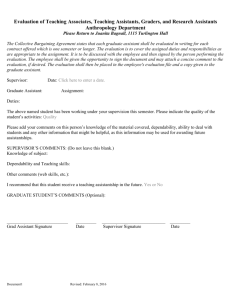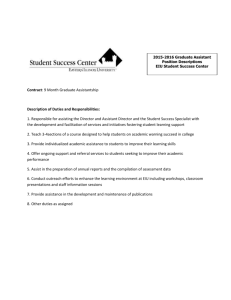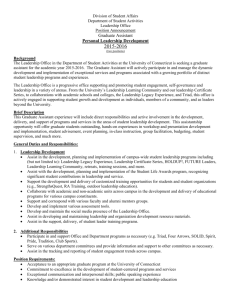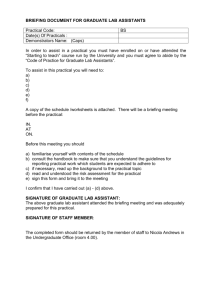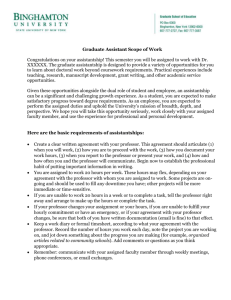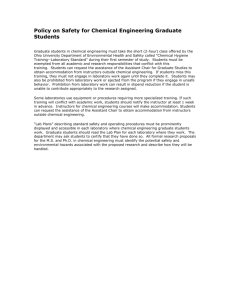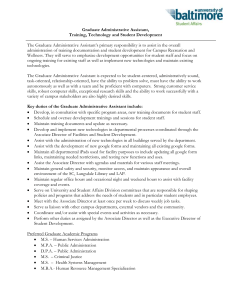UC Davis 2014-2016 General Catalog
advertisement
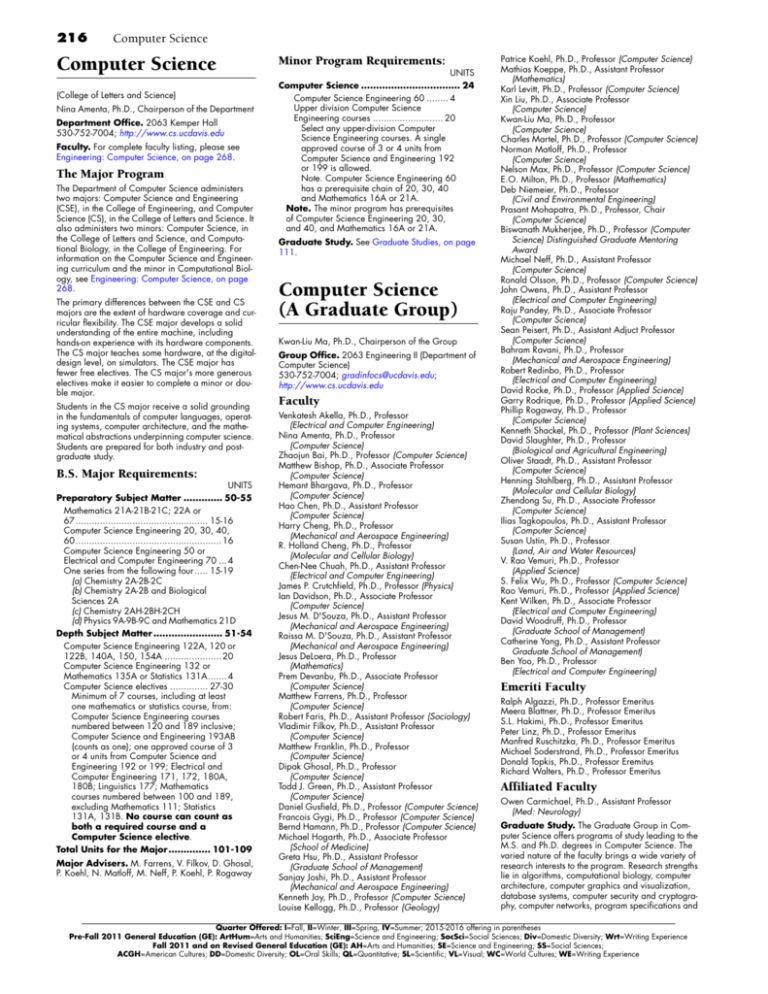
216 Computer Science Computer Science (College of Letters and Science) Nina Amenta, Ph.D., Chairperson of the Department Department Office. 2063 Kemper Hall 530-752-7004; http://www.cs.ucdavis.edu Faculty. For complete faculty listing, please see Engineering: Computer Science, on page 268. The Major Program The Department of Computer Science administers two majors: Computer Science and Engineering (CSE), in the College of Engineering, and Computer Science (CS), in the College of Letters and Science. It also administers two minors: Computer Science, in the College of Letters and Science, and Computational Biology, in the College of Engineering. For information on the Computer Science and Engineering curriculum and the minor in Computational Biology, see Engineering: Computer Science, on page 268. The primary differences between the CSE and CS majors are the extent of hardware coverage and curricular flexibility. The CSE major develops a solid understanding of the entire machine, including hands-on experience with its hardware components. The CS major teaches some hardware, at the digitaldesign level, on simulators. The CSE major has fewer free electives. The CS major's more generous electives make it easier to complete a minor or double major. Students in the CS major receive a solid grounding in the fundamentals of computer languages, operating systems, computer architecture, and the mathematical abstractions underpinning computer science. Students are prepared for both industry and postgraduate study. B.S. Major Requirements: UNITS Preparatory Subject Matter ............. 50-55 Mathematics 21A-21B-21C; 22A or 67................................................. 15-16 Computer Science Engineering 20, 30, 40, 60...................................................... 16 Computer Science Engineering 50 or Electrical and Computer Engineering 70 ... 4 One series from the following four ..... 15-19 (a) Chemistry 2A-2B-2C (b) Chemistry 2A-2B and Biological Sciences 2A (c) Chemistry 2AH-2BH-2CH (d) Physics 9A-9B-9C and Mathematics 21D Depth Subject Matter ....................... 51-54 Computer Science Engineering 122A, 120 or 122B, 140A, 150, 154A ..................... 20 Computer Science Engineering 132 or Mathematics 135A or Statistics 131A....... 4 Computer Science electives .............. 27-30 Minimum of 7 courses, including at least one mathematics or statistics course, from: Computer Science Engineering courses numbered between 120 and 189 inclusive; Computer Science and Engineering 193AB (counts as one); one approved course of 3 or 4 units from Computer Science and Engineering 192 or 199; Electrical and Computer Engineering 171, 172, 180A, 180B; Linguistics 177; Mathematics courses numbered between 100 and 189, excluding Mathematics 111; Statistics 131A, 131B. No course can count as both a required course and a Computer Science elective. Total Units for the Major .............. 101-109 Major Advisers. M. Farrens, V. Filkov, D. Ghosal, P. Koehl, N. Matloff, M. Neff, P. Koehl, P. Rogaway Minor Program Requirements: UNITS Computer Science ................................. 24 Computer Science Engineering 60 ........ 4 Upper division Computer Science Engineering courses .......................... 20 Select any upper-division Computer Science Engineering courses. A single approved course of 3 or 4 units from Computer Science and Engineering 192 or 199 is allowed. Note. Computer Science Engineering 60 has a prerequisite chain of 20, 30, 40 and Mathematics 16A or 21A. Note. The minor program has prerequisites of Computer Science Engineering 20, 30, and 40, and Mathematics 16A or 21A. Graduate Study. See Graduate Studies, on page 111. Computer Science (A Graduate Group) Kwan-Liu Ma, Ph.D., Chairperson of the Group Group Office. 2063 Engineering II (Department of Computer Science) 530-752-7004; gradinfocs@ucdavis.edu; http://www.cs.ucdavis.edu Faculty Venkatesh Akella, Ph.D., Professor (Electrical and Computer Engineering) Nina Amenta, Ph.D., Professor (Computer Science) Zhaojun Bai, Ph.D., Professor (Computer Science) Matthew Bishop, Ph.D., Associate Professor (Computer Science) Hemant Bhargava, Ph.D., Professor (Computer Science) Hao Chen, Ph.D., Assistant Professor (Computer Science) Harry Cheng, Ph.D., Professor (Mechanical and Aerospace Engineering) R. Holland Cheng, Ph.D., Professor (Molecular and Cellular Biology) Chen-Nee Chuah, Ph.D., Assistant Professor (Electrical and Computer Engineering) James P. Crutchfield, Ph.D., Professor (Physics) Ian Davidson, Ph.D., Associate Professor (Computer Science) Jesus M. D'Souza, Ph.D., Assistant Professor (Mechanical and Aerospace Engineering) Raissa M. D'Souza, Ph.D., Assistant Professor (Mechanical and Aerospace Engineering) Jesus DeLoera, Ph.D., Professor (Mathematics) Prem Devanbu, Ph.D., Associate Professor (Computer Science) Matthew Farrens, Ph.D., Professor (Computer Science) Robert Faris, Ph.D., Assistant Professor (Sociology) Vladimir Filkov, Ph.D., Assistant Professor (Computer Science) Matthew Franklin, Ph.D., Professor (Computer Science) Dipak Ghosal, Ph.D., Professor (Computer Science) Todd J. Green, Ph.D., Assistant Professor (Computer Science) Daniel Gusfield, Ph.D., Professor (Computer Science) Francois Gygi, Ph.D., Professor (Computer Science) Bernd Hamann, Ph.D., Professor (Computer Science) Michael Hogarth, Ph.D., Associate Professor (School of Medicine) Greta Hsu, Ph.D., Assistant Professor (Graduate School of Management) Sanjay Joshi, Ph.D., Assistant Professor (Mechanical and Aerospace Engineering) Kenneth Joy, Ph.D., Professor (Computer Science) Louise Kellogg, Ph.D., Professor (Geology) Patrice Koehl, Ph.D., Professor (Computer Science) Mathias Koeppe, Ph.D., Assistant Professor (Mathematics) Karl Levitt, Ph.D., Professor (Computer Science) Xin Liu, Ph.D., Associate Professor (Computer Science) Kwan-Liu Ma, Ph.D., Professor (Computer Science) Charles Martel, Ph.D., Professor (Computer Science) Norman Matloff, Ph.D., Professor (Computer Science) Nelson Max, Ph.D., Professor (Computer Science) E.O. Milton, Ph.D., Professor (Mathematics) Deb Niemeier, Ph.D., Professor (Civil and Environmental Engineering) Prasant Mohapatra, Ph.D., Professor, Chair (Computer Science) Biswanath Mukherjee, Ph.D., Professor (Computer Science) Distinguished Graduate Mentoring Award Michael Neff, Ph.D., Assistant Professor (Computer Science) Ronald Olsson, Ph.D., Professor (Computer Science) John Owens, Ph.D., Assistant Professor (Electrical and Computer Engineering) Raju Pandey, Ph.D., Associate Professor (Computer Science) Sean Peisert, Ph.D., Assistant Adjuct Professor (Computer Science) Bahram Ravani, Ph.D., Professor (Mechanical and Aerospace Engineering) Robert Redinbo, Ph.D., Professor (Electrical and Computer Engineering) David Rocke, Ph.D., Professor (Applied Science) Garry Rodrique, Ph.D., Professor (Applied Science) Phillip Rogaway, Ph.D., Professor (Computer Science) Kenneth Shackel, Ph.D., Professor (Plant Sciences) David Slaughter, Ph.D., Professor (Biological and Agricultural Engineering) Oliver Staadt, Ph.D., Assistant Professor (Computer Science) Henning Stahlberg, Ph.D., Assistant Professor (Molecular and Cellular Biology) Zhendong Su, Ph.D., Associate Professor (Computer Science) Ilias Tagkopoulos, Ph.D., Assistant Professor (Computer Science) Susan Ustin, Ph.D., Professor (Land, Air and Water Resources) V. Rao Vemuri, Ph.D., Professor (Applied Science) S. Felix Wu, Ph.D., Professor (Computer Science) Rao Vemuri, Ph.D., Professor (Applied Science) Kent Wilken, Ph.D., Associate Professor (Electrical and Computer Engineering) David Woodruff, Ph.D., Professor (Graduate School of Management) Catherine Yang, Ph.D., Assistant Professor Graduate School of Management) Ben Yoo, Ph.D., Professor (Electrical and Computer Engineering) Emeriti Faculty Ralph Algazzi, Ph.D., Professor Emeritus Meera Blattner, Ph.D., Professor Emeritus S.L. Hakimi, Ph.D., Professor Emeritus Peter Linz, Ph.D., Professor Emeritus Manfred Ruschitzka, Ph.D., Professor Emeritus Michael Soderstrand, Ph.D., Professor Emeritus Donald Topkis, Ph.D., Professor Eremitus Richard Walters, Ph.D., Professor Emeritus Affiliated Faculty Owen Carmichael, Ph.D., Assistant Professor (Med: Neurology) Graduate Study. The Graduate Group in Computer Science offers programs of study leading to the M.S. and Ph.D. degrees in Computer Science. The varied nature of the faculty brings a wide variety of research interests to the program. Research strengths lie in algorithms, computational biology, computer architecture, computer graphics and visualization, database systems, computer security and cryptography, computer networks, program specifications and Quarter Offered: I=Fall, II=Winter, III=Spring, IV=Summer; 2015-2016 offering in parentheses Pre-Fall 2011 General Education (GE): ArtHum=Arts and Humanities; SciEng=Science and Engineering; SocSci=Social Sciences; Div=Domestic Diversity; Wrt=Writing Experience Fall 2011 and on Revised General Education (GE): AH=Arts and Humanities; SE=Science and Engineering; SS=Social Sciences; ACGH=American Cultures; DD=Domestic Diversity; OL=Oral Skills; QL=Quantitative; SL=Scientific; VL=Visual; WC=World Cultures; WE=Writing Experience Conservation Biology verification, programming languages and compilers, parallel and distributed systems, scientific computation, and software engineering. Interdisciplinary research in computer science is encouraged. Graduate Preparation. Normal preparation for the program is a bachelor's degree in either computer science or in a closely related field (such as electrical engineering or mathematics, with substantial course work in computer science). Applications are also considered from students with outstanding records in other disciplines. M.S. students may either complete a thesis or pass a comprehensive examination. Ph.D. students must pass a qualifying oral examination and complete a dissertation demonstrating original research in an area approved by the Graduate Group. Professional Graduate Advisers. H. Chen, P. Devanbu, M. Farrens, D. Ghosal, V. Filkov P. Rogaway 299. Research (1-12) (S/U grading only.) 396. Teaching Assistant Training Practicum (1-4) Prerequisite: graduate standing. May be repeated for credit. (S/U grading only.)—I, II, III. (I, II, III.) Contemporary Leadership (College of Agricultural and Environmental Sciences) Conservation Biology See Ecology (A Graduate Group), on page 229; Environmental Biology and Management, on page 295; and Wildlife, Fish, and Conservation Biology, on page 544. Consumer Science (College of Agricultural and Environmental Sciences) Faculty. See under the Division of Textiles and Clothing, on page 525. Major Programs. The Consumer Food Science option under the Food Science major is a related program. See also Food Science and Technology, on page 313, Nutrition, on page 454, and Textiles and Clothing, on page 525. Graduate Study. For graduate study, see Graduate Studies, on page 111. Courses in Consumer Science (CNS) Questions pertaining to the following courses should be directed to the Division of Textiles and Clothing Advising office in 129 Everson Hall. Lower Division 92. Internship in Consumer Science (1-12) Internship—3-36 hours. Prerequisite: consent of instructor. Internship on and off campus in a consumer science related area. (P/NP grading only.) Upper Division 100. Consumer Behavior (3) Lecture—3 hours. Prerequisite: preparation in areas of psychology or sociology and economics recommended. Provides a set of behavioral concepts and theories useful in understanding consumer behavior on the part of the individual, business, and social organizations. Conceptual models to help guide and understand consumer research will be presented. GE credit: SocSci, Div, Wrt | SS, WE. 192. Internship in Consumer Science (1-12) Internship—3-36 hours. Prerequisite: completion of a minimum of 84 units; consent of instructor. Internship on and off campus in a consumer science related area. (P/NP grading only.) 198. Directed Group Study (1-5) (P/NP grading only.) 199. Special Study for Advanced Undergraduates (1-5) (P/NP grading only.) The Science and Society Program offers a minor in Contemporary Leadership, open to all undergraduate students regardless of major. The minor provides a broad overview of leadership theory and practice, and engages students in critical thinking, self-reflection, problem solving and multicultural education. Students should contact the minor adviser for course selection and plan approval. Consult advisors often to insure timely enrollment in Science and Society 192 and 190X as courses with fewer than ten students will not be taught. Minor Program Requirements: UNITS Contemporary Leadership..................... 24 Core Leadership Courses Science and Society 130 ........................ 4 Science and Society 192 (must be taken concurrently with an approved internship) ............................................. 2 Science and Society 190X ...................... 2 Preparatory Subject Matter Students are required to complete four units from each of the following four categories. All courses are four units unless specified in parentheses: Ethics and Values: Animal Science 170, Computer Science 188 (3), English 107, Environmental Science and Policy 164 (3), Nature and Culture 120, Philosophy 115, 116, 117, Psychology 175.................. 4 Communication, Interpersonal Relationships and Human Dynamics: Anthropology 139AN, Communication 134, 135, 136, Community and Regional Development 172, 174, Linguistics 163, Psychology 151, Sociology 126, 132, University Writing Program 104 (A-F)................... 4 Organization Structure and Cultures: American Studies 125, Anthropology 105, 123BN, Community and Regional Development 152, 154, 158, 164, Sociology 30A (3), 156, 180A, 180B, 183, Women's Studies 140 ................. 4 Multiculturalism, the Global Community and Social Change: American Studies 133, 153, 156, Community and Regional Development 176, English 179, History 173, 178A, 178B, Native American Studies 134, Political Science 124, 125, 130, Textiles and Clothing 174 ............ 4 Minor Adviser. The list of appropriate courses changes over time. Consult Elvira Galvan Hack in Science and Society (Plant Pathology) to request an advising appointment at eghack@ucdavis.edu. 217 Critical Theory David Simpson, Ph.D., Chairperson of the Program Program Office. 216 Sproul Hall 530-752-5799; http://crittheory.ucdavis.edu Committee in Charge Nathan Brown, Ph.D. (English) Kathleen Frederickson, Ph.D. (English) Neil Larsen, Ph.D. (Comparative Literature) Kriss Ravetto-Biagioli, Ph.D. (Cinema and Technocultural Studies) Sven-Erik Rose, Ph.D. (German) Scott Shershow, Ph.D. (English) David Simpson, Ph.D. (English) Graduate Study. The program in Critical Theory offers study and research leading to the Ph.D. with a designated emphasis in Critical Theory. The program provides theoretical emphasis and interdisciplinary perspective to students already preparing for the Ph.D. in one of 14 participating graduate programs (Anthropology, Comparative Literature, Culture Studies, Education, English, French, German, History, Music, Psychology, Sociology, Spanish, Study of Religion, and Performance Studies). Students complete all requirements for the Ph.D., including the dissertation, in one of the participating departments. Minimum coursework for the Critical Theory Designated Emphasis consists of four courses. The first three of these, Critical Theory 200A, 200B, and 200C are taught by affiliated faculty, with 200A normally being taken first. For the fourth course, students have the option of taking another section of Critical Theory 200B or an approved course from any affiliated department. Graduate Adviser. Consult Critical Theory Program office. Courses in Critical Theory (CRI) Upper Division 101. Introduction to Critical Theoretical Approaches to Literature and Culture (4) Lecture/discussion—3 hours; term paper. Prerequisite: one upper division literature course or consent of instructor. Introduction to critical theory and its use for interpreting literary texts, film, and media forms in our present global culture. (Same course as Comparative Literature 141.) GE credit: ArtHum, Wrt | AH, WC, WE.—III. (III.) Graduate 200A. Approaches to Critical Theory (4) Seminar—3 hours; term paper. Prerequisite: graduate standing in a participating program. Restricted to Graduate students. Critical overview of modern theoretical texts; e.g., semiotics, hermeneutics, deconstruction, social and cultural critique, feminist theory, psychoanalysis.—I, II, III. (I, II, III.) 200B. Problems in Critical Theory (4) Seminar—3 hours; term paper. Restricted to Graduate students. Focused study of a particular critical theoretical approach, school or perspective. Topics may include but are not limited to: critical approaches to the study of literature, culture, film, historiography, visual culture, the body, and aesthetics. May be repeated for credit with consent of instructor.—I, II, III. (I, II, III.) 200C. History of Critical Theory (4) Seminar—3 hours; term paper. Restricted to Graduate students. Critical analysis and discussion of pretwentieth century theories of literary and cultural criticism. Topics may include but are not limited to: ancient and early modern philosophy; nature and culture in the Renaissance; theories of Mimesis from antiquity to the Renaissance. May be repeated for credit when topic differs and with consent of instructor.—I, II, III. (I, II, III.) Quarter Offered: I=Fall, II=Winter, III=Spring, IV=Summer; 2015-2016 offering in parentheses Pre-Fall 2011 General Education (GE): ArtHum=Arts and Humanities; SciEng=Science and Engineering; SocSci=Social Sciences; Div=Domestic Diversity; Wrt=Writing Experience Fall 2011 and on Revised General Education (GE): AH=Arts and Humanities; SE=Science and Engineering; SS=Social Sciences; ACGH=American Cultures; DD=Domestic Diversity; OL=Oral Skills; QL=Quantitative; SL=Scientific; VL=Visual; WC=World Cultures; WE=Writing Experience
